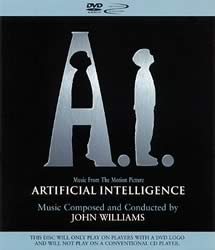Artificial Intelligence: AI-Music from the Motion Picture (DVD-Audio) (2001) (NTSC) |
|
Artificial Intelligence: AI-Music from the Motion Picture (DVD-Audio) (2001) (NTSC) |
|


|
| BUY IT |
| General | Extras | ||
| Category | Music |
Booklet Notes-Notes From Steven Spielberg Gallery-Photo Notes-Credits |
|
| Rating |

|
||
| Year Of Production | 2001 | ||
| Running Time | 70:22 | ||
| RSDL / Flipper | No/No | Cast & Crew | |
| Start Up | Menu | ||
| Region Coding | 4 | Directed By | John Williams |
|
Studio
Distributor |
 Warner Vision |
Starring |
John Williams Lara Fabian Josh Groban |
| Case | DVD-Audio Jewel | ||
| RPI | $32.95 | Music | John Williams |
| Video (NTSC) | Audio | ||
| Pan & Scan/Full Frame | Full Frame |
Audio Dolby Digital 5.1 Audio MLP 88.2/24 5.1 Audio MLP 88.2/24 2.0 |
|
| Widescreen Aspect Ratio | None | ||
| 16x9 Enhancement | No | ||
| Video Format | 480i (NTSC) | ||
| Original Aspect Ratio | 1.33:1 | Miscellaneous | |
| Jacket Pictures | No | ||
| Subtitles | None | Smoking | No |
| Annoying Product Placement | No | ||
| Action In or After Credits | No | ||
Someone once said that the ideal film composer is one who is versatile enough to emulate multiple styles of music and yet be original enough to create something that is listenable on its own. Directors often edit the first cut of a film using a "temp track" as the soundtrack - a pastiche of excerpts from various pieces of music that the director thought fitted the mood of the film. Many directors become so enamoured with the temp track they specifically choose a film score composer who can create material that resembles the temp track - for example Vangelis was asked by director Ridley Scott to recreate a song along the same lines as "If I Didn't Care" by the Ink Spots for the movie Blade Runner. Director Stanley Kubrick became so attached to the temp track for 2001: A Space Odyssey that he ended up using it!
John Williams is an example of a film composer who doesn't mind copying genres to create a specific mood for a film. Many parts of Star Wars, for example, sound like passages from Holst's The Planets. In the soundtrack for Steven Spielberg's Artificial Intelligence (A.I.), John seems to be referencing multiple sources including himself (primarily his film scores for two other of Spielberg's films including Close Encounters of the Third Kind and E.T.).
The opening track, The Mecha World, sounds vaguely like a John Adams orchestral piece mixed in with bits from Close Encounters. Abandoned in the Woods sounds like a weird combination between Philip Glass and the soundtrack to E.T. After this, the soundtrack decides to leave minimalism and starts borrowing heavily from the soundtrack to 2001: A Space Odyssey - Replicas contains a replica of the haunting vocals in György Ligeti's Lux Aeterna and Requiem (used extensively in 2001 whenever the monolith appears). Cybertronics is a blatant copycat of the Adagio from the Gayaneh Ballet Suite by Aram Khachaturian (used in 2001 during the exterior shots of the spacecraft flying through space).
Other songs are perhaps more evocative of the film's storyline - Hide and Seek contains a brilliant dialogue between a real piano (presumably representing Monica) and a synthesizer (representing David). The Moon Rising starts off like Close Encounters but then becomes "techno" and Rogue City has a meandering sound - a perfect reference to androids who have drifted off the straight and narrow - but at the same time mildly evocative of John Adam's Shaker Loops.
Perhaps the most memorable theme is the haunting melody to For Always which curiously reminded me of the love theme from Anna and the King. The soundtrack ensures we will remember the theme long after the disc has stopped spinning - it is represented on no less than five tracks, as a straight ballad sung by Lara Fabian, as a duet sung by Lara Fabian and Josh Graham, and in various instrumental arrangements in tracks 8, 9 and 12 (the last being my favourite - The Reunion - although the vocalised arrangement in Where Dreams Are Born comes close).
All in all, this is a listenable and atmospheric soundtrack, especially if you are a fan of John Williams and/or enjoyed the film. I still think his best film score is E.T. which I've listened to many many times, but this one comes close. Some may find the plagiarism annoying, but I found it a fun exercise piecing together the clues and trying to identify the source material.
| 1. The Mecha World 2. Abandoned In The Woods 3. Replicas 4. Hide & Seek 5. For Always 6. Cybertronics 7. The Moon Rising | 8. Stored Memories & Monica’s theme 9. Where Dreams Are Born 10. Rouge City 11. The Search For The Blue Fairy 12. The Reunion 13. For Always (Duet) |
Like most Warner DVD-Audio discs released to date, the video content on this disc is in full frame NTSC and consists of a number of stills - textual and photographic. Each song is accompanied by a soft focused still and the title of the song framed in a letterboxed 2.00:1 aspect ratio.
| Sharpness | |
| Shadow Detail | |
| Colour | |
| Grain/Pixelization | |
| Film-To-Video Artefacts | |
| Film Artefacts | |
| Overall |
There are three audio tracks on this DVD-Audio disc: MLP 88.2/24 5.1 and 2.0 on the DVD-Audio portion of the disc and Dolby Digital 5.1 (448 Kb/s) on the DVD-Video portion of the disc. I listened to all tracks in their entirety. Unfortunately, I do not own a CD version to compare the DVD Audio against.
In general, the recording was pleasant enough to listen to and quite reverberant. Some tracks (for example, The Moon Rising) contained significant and copious low level frequencies even on the stereo version and will be a good demonstration of how well your front speakers can handle deep bass. Put it this way - if you can't hear a lot of bass on the stereo version, then it's probably time to invest in better speakers, or a good subwoofer (and hope your player has bass management)!
The multi-channel mix (both MLP and Dolby Digital) is fairly conservative since the instruments are fairly front focused and the rear speakers seem to be mainly used for ambience and to extend/widen the soundstage. The low frequencies present in the stereo version have been transferred to the LFE track for the subwoofer to digest.
I wished I could compare the DVD Audio with the CD. Whilst the recording seemed acceptable enough, there was not the "wow" factor that I normally associate with good DVD Audio discs. The stereo version in particular sounded like a CD recording. Lara Fabian's vocals in For Always (both versions) seemed somewhat harsh and full of glaze and very uncharacteristic of a high resolution recording.
The multi-channel mix of course sounded more impressive than the stereo mix, but again not overwhelmingly so and not much different from, say, applying Dolby Pro Logic II to the stereo mix. The only instance where I could detect a more aggressive positioning of instruments to the rear channels was in The Moon Rising.
The Dolby Digital 5.1 track sounded very similar to the MLP 5.1 track, to the extent that I would not be able to easily tell those two apart if I wasn't comparing them side by side.
| Dialogue | |
| Audio Sync | |
| Clicks/Pops/Dropouts | |
| Surround Channel Use | |
| Subwoofer | |
| Overall |
As is usual for most Warner DVD Audio releases, the extras on the disc are pretty minimal.
Full frame and static, although there seems to be a tendency to limit the menu screens to a letterboxed aspect ratio of 2.00:1 and navigation items to the "black bar" below the still.
This is a minimal booklet consisting of a single sheet of paper folded in half to create four "pages." The inner pages contain a listing of tracks plus copyright and production credits. The back page consists of a mini-essay by Steven Spielberg (also reproduced as a still as per description below).
This is a single still containing a one paragraph mini-essay from Steven Spielberg and an accompanying photo of Steven and John.
This contains 12 stills of various photos taken from the film.
This is a single still crediting those involved in the album.
NOTE: To view non-R4 releases, your equipment needs to be multi-zone compatible and usually also NTSC compatible.
This disc is not region coded and appears to be identically featured across all regions.
Music From The Motion Picture Artificial Intelligence (A.I.) has composer John Williams "borrowing" from many sources including some of his other film scores. I found it pleasant enough to listen to, but the DVD Audio did not strike me as being spectacular and this is probably not the ideal disc to demonstrate to your friends just how much "better" high resolution audio sounds.
| Video | |
| Audio | |
| Extras | |
| Plot | |
| Overall |
| Review Equipment | |
| DVD | Pioneer DV-S733A, using Component output |
| Display | Sony VPL-VW11HT LCD Projector, ScreenTechnics 16x9 matte white screen (254cm). Calibrated with Video Essentials/Ultimate DVD Platinum. This display device is 16x9 capable. |
| Audio Decoder | Built in to DVD player. Calibrated with Video Essentials/Ultimate DVD Platinum. |
| Amplification | Denon AVR-3300 |
| Speakers | Front and rears: B&W CDM7NT; centre: B&W CDMCNT; subwoofer: B&W ASW2500 |